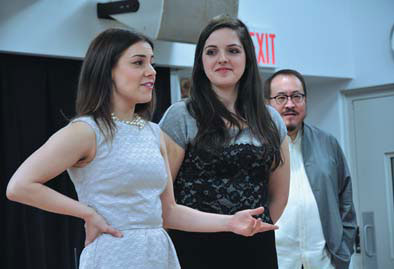West gets lesson in Chinese opera
Updated: 2013-02-01 09:27
By Caroline Berg in New York (China Daily)
|
|||||||||||
Program strikes new tone for US music students
How difficult is it to sing opera in Mandarin?
This was the first question raised by a middle school student at The Dalton School in Manhattan on Tuesday after meeting three American soprano singers who participated in the pioneering I Sing Beijing performing arts exchange program, which trains Western opera students to sing Mandarin opera.
|
 |
|
Soprano singers Meghan Picerno (left) and Nicole Haslett discuss studying Mandarin language opera with students at The Dalton School as Tian Haojiang, the founder of the exchange program, looks on. [Photo/ China Daily] |
"Particularly trying to understand and remember the pattern of the tones and also how the pattern of the tones can change when they're in a certain order was extremely difficult."
Now heading into its third year, I Sing Beijing gives Western opera students the opportunity to work with top Chinese opera singers in Beijing each summer. The program was launched in 2010 by principal soloist Tian Haojiang, who performed with the Metropolitan Opera for two decades.
I Sing Beijing is now developing an outreach to US schools to further expose students to the art and possibilities of Mandarin-language opera.
"I think it's so important that people, especially Western people, know that this form of Chinese opera is possible and an option" to pursue, said soprano Meghan Picerno, who participated in the exchange program last summer. "It's not even just an option, but one where I think classical music is going."
After spending six hours a day studying Mandarin for four weeks, then performing on Beijing's premier performance stage, Picerno's life has changed forever, she said.
"I immediately came back to (New York) and broke my lease so I could be in a cheaper place because I need to take more coaching and get into more music, and I want to continue learning Mandarin," the soprano said.
During her time with I Sing Beijing, Picerno discovered "a completely new world of classical music" where there are "endless opportunities" she could not have imagined before.
The experience of exploring daily life in China was also valuable, she said.
"If you had to take a taxi, they did not speak any English, so you could point all you want, but you had better know how to say certain things," Picerno said. "So we learned really quickly how to adapt."
I Sing Beijing will perform at Lincoln Center's Alice Tully Hall on Feb 16.
"This is truly a historic event," Tian said.
The performance will be the first in New York for Western singers trained in modern Mandarin lyric diction.
Meanwhile, auditions for I Sing Beijing's third summer session in Beijing will begin in three US cities next week, and the talent search will continue in Europe and China in April. The program will admit 20 Western singers and 10 mainland Chinese singers for this year's exchange.
carolineberg@chinadailyusa.com
Related Stories
Chinese leaders watch Peking Opera for New Year 2012-12-31 13:48
Tibet Opera to return to center stage 2012-12-28 03:06
Classic Chinese opera captivates New York 2012-12-04 04:09
Opera singing mayor surprises residents 2012-11-27 16:31
Royal Opera chief gets top job at BBC 2012-11-23 09:28
Today's Top News
Police continue manhunt for 2nd bombing suspect
H7N9 flu transmission studied
8% growth predicted for Q2
Nuke reactor gets foreign contract
First couple on Time's list of most influential
'Green' awareness levels drop in Beijing
Palace Museum spruces up
Trading channels 'need to broaden'
Hot Topics
Lunar probe , China growth forecasts, Emission rules get tougher, China seen through 'colored lens', International board,
Editor's Picks

|

|

|

|

|

|





